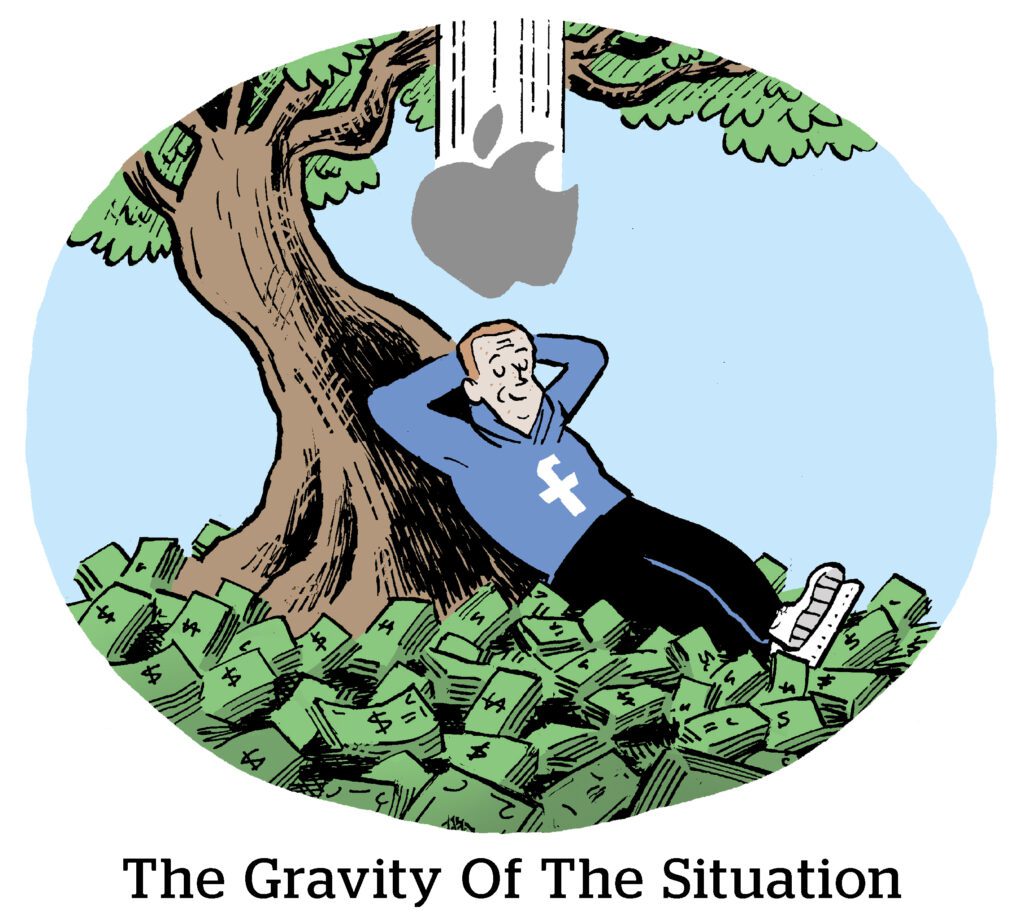Here’s today’s AdExchanger.com news round-up… Want it by email? Sign up here.
AdExchanger is taking the day off for Presidents Day. Our daily news roundup will return on Tuesday, Feb. 20.
Meta Vs. Apple
The tension between Meta and Apple just keeps growing.
Their latest feud is over the 30% fee Apple charges US advertisers for boosting social campaigns, including on Facebook and Instagram. While Meta says content promotion should count as advertising, Apple contests that it counts as an in-app purchase, hence the fee, The Wall Street Journal reports.
So Meta is sticking it to Apple by giving advertisers a workaround to avoid paying the fee.
It’s advising advertisers to prepay for their social campaigns on Facebook and Instagram web browsers. That way, when brands boost specific content within the app as part of those campaigns, they won’t be charged.
This loophole is Meta’s way of asserting that social campaigns shouldn’t be made unaffordable for small and midsize businesses – or so the argument goes.
Meta has a long-held grudge against Apple (remember ATT?), and the pettiness is pretty obvious. Earlier this week, Zuckerberg posted a video about how much better Meta’s Oculus Quest is compared to Apple’s Vision Pro headset.
May the best Big Tech behemoth crush its counterpart.
Long Live Panels
Alternative currency providers won’t stop trying to eat Nielsen’s lunch. But Nielsen panels may persist for years to come.
Almost every media company already trades on Nielsen ratings based on average commercial minutes, which will be around until at least 2025. The measurement incumbent has also renewed multiyear contracts with networks at fixed prices, Ad Age reports, making it even more expensive to try alternatives.
And according to industry analyst Brian Wieser in a recent report commissioned by CIMM, “Nielsen’s incumbency and cost-effectiveness will likely keep it in a prominent position.”
Still, alt currencies have a chance to stand out by offering advanced audiences.
Advertisers are under rising pressure to prove their TV campaigns drive actual business outcomes, like sales and conversions, which requires measuring more than just age and gender.
VideoAmp in particular has a reputation for advanced audience data – but it’ll take much more than more data to dethrone Nielsen.
“How well competitors fare will likely depend on how long the capital they have raised will last and whether they can raise more capital,” Wieser writes.
That could be bad tidings for VideoAmp.
Temu’s Time Signature
Temu’s viral Super Bowl play may have been better thought out than simply pouring tens of millions of dollars into 30-second spots and hoping for the best.
The Chinese ecommerce challenger paid to replay the same spot during the Big Game multiple times with the expectation that a consistent jingle would help boost ad recall and brand favorability, Marketing Brew reports.
Some ad experts say that advertising jingles have fallen out of style because, well, they can be irritating ear worms. But it turns out that the effectiveness of jingles varies by region. Jingles remain a popular marketing strategy in Japan, for example. And the fact remains that jingles boost the “memorability” of an ad, which makes it more likely a consumer will choose that brand’s product when they’re in a store.
The same logic applies to Temu. As a challenger brand in the US, it’s aiming to woo consumers away from its biggest North American competitor, Amazon.
But will it work? Probably not.
Other than resurfacing public skepticism about Temu’s shady data collection practices, the music in its Super Bowl ads was not only annoying but lacked the “fresh sound resonating with younger consumers today,” Geoffrey Goldberg, chief creative officer at creative agency Movers+Shakers, tells Marketing Brew.
Better luck next time, Temu.
But Wait, There’s More!
Most major streaming services are raising their ad volume. [Business Insider]
The University of Michigan is selling audio recordings of study groups and lectures for tens of thousands of dollars to third parties that will use the audio to train large language models. [404 Media]
An FTC complaint could ban a California-based company from advertising its products as a treatment or cure for COVID-19. [release]
X is accused of selling subscription perks to the terrorist group Hezbollah. [BBC News]
You’re Hired!
Nexstar Media Group hires Stacey Lynn Schulman as EVP of platform marketing and intelligence. [release]












